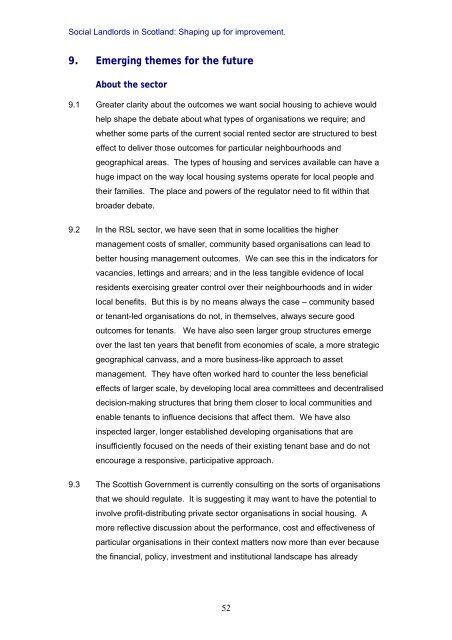Social Landlords in Scotland: Shaping up for improvement
Social Landlords in Scotland: Shaping up for improvement
Social Landlords in Scotland: Shaping up for improvement
You also want an ePaper? Increase the reach of your titles
YUMPU automatically turns print PDFs into web optimized ePapers that Google loves.
<strong>Social</strong> <strong>Landlords</strong> <strong>in</strong> <strong>Scotland</strong>: Shap<strong>in</strong>g <strong>up</strong> <strong>for</strong> <strong>improvement</strong>.9. Emerg<strong>in</strong>g themes <strong>for</strong> the futureAbout the sector9.1 Greater clarity about the outcomes we want social hous<strong>in</strong>g to achieve wouldhelp shape the debate about what types of organisations we require; andwhether some parts of the current social rented sector are structured to besteffect to deliver those outcomes <strong>for</strong> particular neighbourhoods andgeographical areas. The types of hous<strong>in</strong>g and services available can have ahuge impact on the way local hous<strong>in</strong>g systems operate <strong>for</strong> local people andtheir families. The place and powers of the regulator need to fit with<strong>in</strong> thatbroader debate.9.2 In the RSL sector, we have seen that <strong>in</strong> some localities the highermanagement costs of smaller, community based organisations can lead tobetter hous<strong>in</strong>g management outcomes. We can see this <strong>in</strong> the <strong>in</strong>dicators <strong>for</strong>vacancies, lett<strong>in</strong>gs and arrears; and <strong>in</strong> the less tangible evidence of localresidents exercis<strong>in</strong>g greater control over their neighbourhoods and <strong>in</strong> widerlocal benefits. But this is by no means always the case – community basedor tenant-led organisations do not, <strong>in</strong> themselves, always secure goodoutcomes <strong>for</strong> tenants. We have also seen larger gro<strong>up</strong> structures emergeover the last ten years that benefit from economies of scale, a more strategicgeographical canvass, and a more bus<strong>in</strong>ess-like approach to assetmanagement. They have often worked hard to counter the less beneficialeffects of larger scale, by develop<strong>in</strong>g local area committees and decentraliseddecision-mak<strong>in</strong>g structures that br<strong>in</strong>g them closer to local communities andenable tenants to <strong>in</strong>fluence decisions that affect them. We have also<strong>in</strong>spected larger, longer established develop<strong>in</strong>g organisations that are<strong>in</strong>sufficiently focused on the needs of their exist<strong>in</strong>g tenant base and do notencourage a responsive, participative approach.9.3 The Scottish Government is currently consult<strong>in</strong>g on the sorts of organisationsthat we should regulate. It is suggest<strong>in</strong>g it may want to have the potential to<strong>in</strong>volve profit-distribut<strong>in</strong>g private sector organisations <strong>in</strong> social hous<strong>in</strong>g. Amore reflective discussion about the per<strong>for</strong>mance, cost and effectiveness ofparticular organisations <strong>in</strong> their context matters now more than ever becausethe f<strong>in</strong>ancial, policy, <strong>in</strong>vestment and <strong>in</strong>stitutional landscape has already52

















